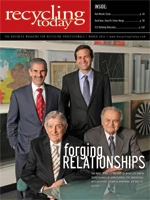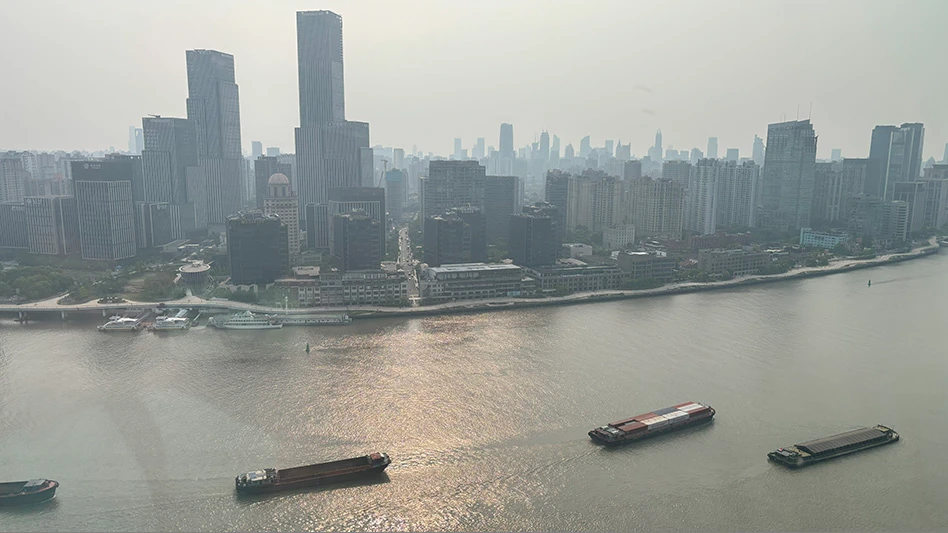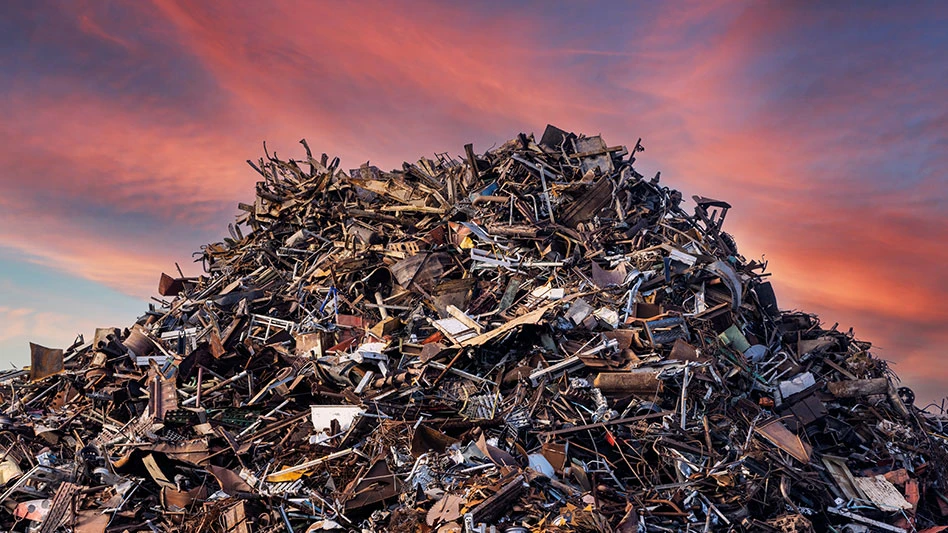A Greener Solution LLC (AGS), a landfill avoidance and recycling consulting firm, emanated from dialog between Robert Render and David Kaplan, founders and co-owners of Maine Plastics Inc. (MPI).
MPI, Zion, Ill., has been in business for more than 25 years as a post-industrial plastics recycler and processor. The growing company now has operations in Kankakee, Ill.; Stratford, Conn.; Dover, Del.; Schoolcraft, Mich.; Apex, N.C.; Richmond, Va.; and Kearney and Columbus, Neb.
In 2010, MPI processed more than 120 million pounds of recyclables and the company says it expects to reach 140 million pounds in 2011.
The creation of AGS six years ago provided an opportunity to leverage MPI’s skills as a recycler of plastics while also serving as a consultant to corporations that were seeking ways to reduce solid waste disposal volume.
Render, who serves as CEO of AGS, says the company manages customers’ recyclables, solid waste and non-salable products. AGS, also based in Zion, specializes in helping companies meet their landfill reduction goals.
Recycling Today (RT): What was the genesis of moving from a plastics recycling company to one that works with companies looking to reduce their solid waste stream?
Robert Render (RR): Our scrap plastics suppliers were asking us to help them find partners to reduce their waste and recycle more. Our two largest AGS clients are long-time MPI suppliers. Most plants can recycle at a rate of over 90 percent. The majority of materials diverted are plastic film, OCC (old corrugated containers) and pallets.
RT: How do Maine Plastics Recycling and A Greener Solution LLC interact with each other?
RR: AGS designs and implements the program, and MPI processes the materials. We utilize each others’ expertise in materials, logistics, marketing and
communication.
RT: What kind of learning curve did A Greener Solution have to go through to become proficient in this business?
RR: It took several years to perfect the process and find the right people to manage the programs and the client relationships, which are complex and very demanding. We refined the model and continue to do so by listening and collaborating with our clients.
RT: Will you please walk our readers through the steps that A Greener Solution takes when the company is first contacted by a business?
RR: We first explore what the client is trying to achieve in terms of goals and a time frame. The process and time frame can differ dramatically, based upon the client’s goals. We then schedule a visit to the facility or facilities they wish to be included in the program. It is imperative to have a buy-in for the program at the highest levels to ensure success.
RT: What are some of the differences in dealing with the businesses in these areas?
RR: Office programs are simpler and more straightforward. The recyclables are paper, film and beverage containers.
Programs in manufacturing and distribution vary greatly, depending on what products the client manufactures or distributes. For example, many distribution businesses throw away return goods, which may be combinations of plastics and metals. To divert those materials, we have to find creative processing solutions.
RT: When working with clients, what are some of the key areas your company initially looks at?
RR: We look at trash volumes and costs.
RT: What are the goals that your customers seem to focus on?
RR: Clients often focus on cutting landfill use by a percentage over a fixed number of years. They also might focus on increasing recycling revenues or reducing landfill cost. Some want to go to zero landfill without regard to cost. We try to guide them to maximize recycling and re-use before being fixated on zero landfill.
RT: To what extent do you have to educate your clients? Do they have a good idea of what can or can’t be done?
RR: We do feasibility studies and create a report that projects what can be recycled and its impact on their goals.
Most know what can be recycled but frequently are in the dark as to how much of what they throw away is really recyclable. When we tell them that industrial plants should recycle at a 90 percent rate, they are often surprised until we ask them to give us examples of materials thrown away that they believe cannot be recycled.
RT: Reducing the amount of material going into the Dumpster is one step. Are there other suggestions that AGS uses to lower the amount of material being disposed of?
RR: While we use lean techniques to improve processes in a plant, we do not specialize in manufacturing efficiency consulting. When appropriate, we recommend materials that are less challenging to recycle but that perform as well.
RT: What are the biggest challenges your company deals with when working with clients?
RR: This is a very detailed, intense process, and when clients buy in, they want to move quickly. Managing clients’ expectations and communicating are the biggest challenges.
RT: Do you see greater interest from larger or smaller companies?
RR: Both. Larger generators in areas where tipping fees are higher have the most opportunity for us to make an impact. One client has 350 plants, and we are working in all of them—large and small.
RT: If you are able to extract more recyclables from the stream, do you attempt to process this material yourself or do you seek other processors to handle the material? And, if you are subcontracting to other companies to handle some material, is there a screening process or background check to ensure that they are able to meet the demands?
RR: We want to control the processing of recyclables as much as possible and use outside partners only where it is in the best interest of the program. Any partners are fully screened for compliance and must be approved by the client.
MPI added four plants in 2010 to support client programs so we could closely manage the processing of recyclables.
RT: When you work with a client, is there any friction with the waste management company that is handling the disposal of the material?
RR: It is not uncommon for there to be friction with any vendors servicing the clients. Our process benchmarks their performance and aims to maximize the value of their services. However, many of these vendors have become valued partners to our clients under our management.
RT: Going forward, are there other services that you see growing in interest among A Greener Solution clients?
RR: We support LEED (Leadership in Energy and Environmental Design) certification goals by managing construction and demolition projects for clients who are building plants. We see growth in this area as construction ramps back up, as well as growth in working on energy conservation projects. We are looking for ways to save our clients money and help them meet their goals.
RT: You note for some materials, “We have to find creative processing solutions.” Can you provide examples of creative processing solutions?
RR: For example, one of our clients manufactures medical devices that are made from polypropylene, rubber, stainless steel and polycarbonate. We developed a process to separate all the materials. This stream was previously landfilled. Another stream is comprised of polypropylene, rubber and LDPE (low-density polyethylene) with a saline solution. The process drains the solution and separates the materials.
RT: Are you getting requests from companies about handling electronics?
RR: Not really. There is a solid infrastructure for these materials. We are often asked to help manage the vendors and benchmark their performance.
See our exclusive online extra: Industry Leaders Q & A: Reduction Commitment
Robert Render is the CEO of A Greener Solution LLC and can be reached at rrender@maineplastics.com.

Explore the March 2011 Issue
Check out more from this issue and find your next story to read.
Latest from Recycling Today
- Republic Services, Blue Polymers open Indianapolis recycling complex
- Altilium produces EV battery cells using recycled materials
- Brightmark enters subsidiaries of Indiana recycling facility into Chapter 11
- Freepoint Eco-Systems receives $50M loan for plastics recycling facility
- PET thermoform recycling the focus of new NAPCOR white paper
- Steel Dynamics cites favorable conditions in Q1
- Hydro starts up construction in Spain
- Green Cubes unveils forklift battery line






